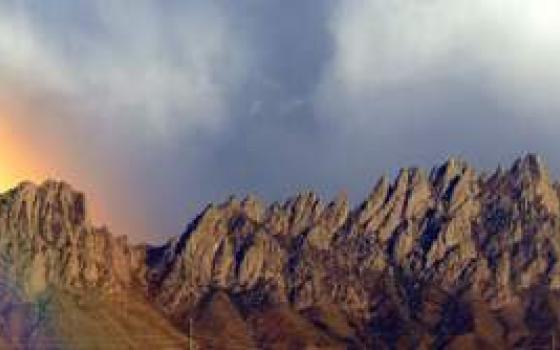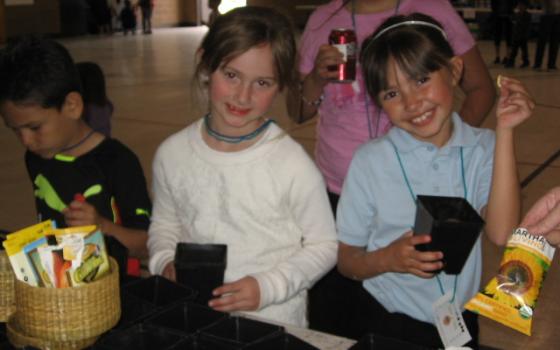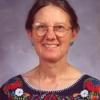It is a warm spring day. I sit in the basement of the University of New Mexico Student Union at a table with other panel members. Lutheran Campus Ministry has organized an educational event around violence and non-violence. My part is to offer an environmental perspective that includes climate change.
“With so much violence in the world, why do you do what you do and how do you keep going?” the moderator asks. When it is my turn I say that we are given the amazing gift of life and as people of faith we cannot do otherwise than act in the face of climate change. I say that the children and the future generations and many people are looking for a deep hope that religious traditions can offer.
These thoughts swirl around in my mind after the panel. One of the speakers, a nationally known author and speaker, and I continue the conversation. He confides that he is not so sure there can be hope if we face the stark realities of a warming planet. At a conference with theologians and scientists last year at Marquette University, experts said we are near a tipping point. They are not the only ones. Last year we reached the level of 400 parts per million (ppm) of carbon dioxide in the atmosphere – well above the 350 ppm for living safely on the planet. Some scientists saw this as another wake up call.
Already we experience unprecedented global temperature increases, storms, devastation, disruption, increased migration and a growing number of human deaths and species extinctions. And yet, just two weeks ago, The Guardian ran an article saying we might be moving toward a tipping point with renewable energy that could be a positive factor.
I am a realist and yet a woman steeped in Franciscan tradition whose roots extend deeply into mystery, love, action and trust. Ultimately we do not know what might happen. We are called to make the path by walking. We are called to love and give ourselves to love, if we believe in the greatest commandment to love God, self and neighbor (meaning human and non-human).
My friend thanks me. I have helped him, he says, as he struggles with realistic hope. I walk outdoors into the bright sunlight and air infused with blossoms. In the plaza two 4-year-olds play. Unexpectedly, I burst into tears. The words of Archbishop Desmond Tutu ring in my ears: “Each day I cry for the state of the world and then I laugh.” Compassion, which feeds action, holds both tears and joy. We are humans who feel deeply. When we do not feel we settle into complacency, non-action, and depression.
Pope Francis said in the Joy of the Gospel writes:
Thanks to our bodies, God has joined us so closely to the world around us that we can feel the desertification of the soil almost as a physical ailment, and the extinction of a species as a painful disfigurement. Let us not leave in our wake a swatch of destruction and death which will affect our own lives and those of future generations.
In 50 years or in 2065, the 4- year- old children will be living in a vastly different world. Some of that world will be very difficult. At a Transition Town workshop last weekend one 55 year-old-man said that if he knew what he knows now about the state of the environment he would not have had children.
I offer a prayer that we of religious traditions are wise enough to face the challenges before us and begin to dig deeply into the meaning of our various spiritual practices, teachings and doctrines in order to build a spiritual foundation for challenging times. I pray that we will be the prophetic and moral voices that are courageous enough to call our communities to action.
Today we celebrate Earth Day. Often people think about and do very good things like recycling, biking, eating local and conserving energy or even looking at solar panel installation. These are noble acts which at this point need to be part of our everyday spiritual practices. Can we challenge ourselves to another level of spiritual living? Can we enter into the practices of our brother Desmond Tutu to each day in prayer or meditation allow ourselves to cry and grieve, then laugh and only then live intentionally into our day, week, month, year with outrageous actions and public policy work for the common good?
As we celebrate our part as members in what Fr. Thomas Berry calls the Sacred Earth Community this week, the poem “Beginners” by Denise Levertov sits upon my heart. I offer an excerpt of this piece that was dedicated to the memory of Karen Silkwood and Eliot Gralla:
But we have only begun
To love the earth.
We have only begun
To imagine the fullness of life.
How could we tire of hope?
–so much is in bud . . . .
We have only begun to know
The power that is in us if we would join
Our solitudes in the communion of struggle.
So much is unfolding that must
Complete its gesture,
So much is in bud.
[Sr. Joan Brown, OSF, is a Franciscan sister from the Franciscan Sisters of Rochester, Minn., and executive director of New Mexico Interfaith Power and Light.]


